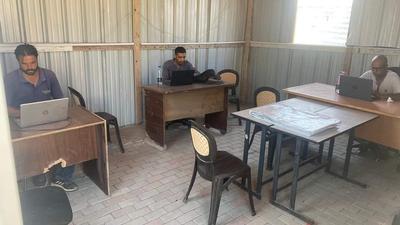Keep digging deep for Gazan journalists
Nearly 10 per cent of the journalist community working in Gaza has been killed, reports IFJ treasurer Jim Boumelha, and now journalists' donations are funding media centres with facilities so they can work and receive food and health parcels.
The number of Gazan killed by Israeli bombs since October 7 has reached 40,000, with another 10,000 entombed in collapsed building. These figures also include is the grim toll of killed journalists which reached over 150, according to the tally of the Palestinian Journalists Syndicate.
In the absence of international journalists, not allowed by the Israeli authorities to enter Gaza independently, their Palestinian colleagues stepped in and have been capturing day in day out the horrendous raw images of the war. To give a sense of the monstrosity of what happened to Gazan journalists, the number of killed may have reached nearly 10 per cent of the journalists’ community working in Gaza – if this is to be extrapolated to NUJ members it would be over 2000, a figure impossible to comprehend.
So far Israeli officials refused to own up having targeted journalists and often dispute the figures. Now they set out to publish doubtful evidence suggesting that some, recently killed, were “terrorists” or “engaged in militant activity”.
As well as killing journalists, media newsroom are being relentlessly smashed to smithereens – some 86 media institutions destroyed, including 22 local radio stations. Plenty of other journalists have perished in other global conflicts such as Iraq or former Yugoslavia, but none in such shocking circumstances and few continued to report the war like the way Gazan journalists are still doing today.
Gazan journalists survived and continued to work as journalists thanks to their resilience and the strength of their collective organisation. They were also supported since the beginning of the war by the solidarity of their colleagues from all the world which maintained the flow of donations that kept sustaining journalists and their families. Sister unions, including the NUJ, showed enormous generosity in what has been the biggest crowdfunding operation mounted by the International Federation of Journalists. Even employers’ organisations contributed.

While at the beginning donations were used to buy safety kits and power banks, later they paid for food, baby milk and medications among other needs. More recently, the effort focused more on building a hub for journalists to give them a roof over their heads, at a time when all their newsrooms were destroyed, and provide them with the means to do their job. A massive injection of funds from sister unions in Canada and Norway, as well as contributions from UNESCO, allowed the PJS to build the first of two solidarity centres.
Journalists who queue to use the facilities have for the first time free access to electricity, water, internet with a fiber service, laptops as well as coffee and bathrooms. The centre is staffed by volunteers who work under the direction of the centre manager and an IT expert to provide assistance to journalists. It also serves as temporary headquarters for the PJS in Rafah and Khan Younes, in southern Gaza, and provides food supplies and health parcels for 500 journalists and their families in this catchment area.
Now that a second centre is being prepared in Deir al Balah, another social hub and a place to work and recuperate, Palestinian colleagues feel strong enough to resist whatever the Israeli army keep throwing at them. The onus is on all of us, our branches, chapels and members, to continue our support in whatever way we can.
